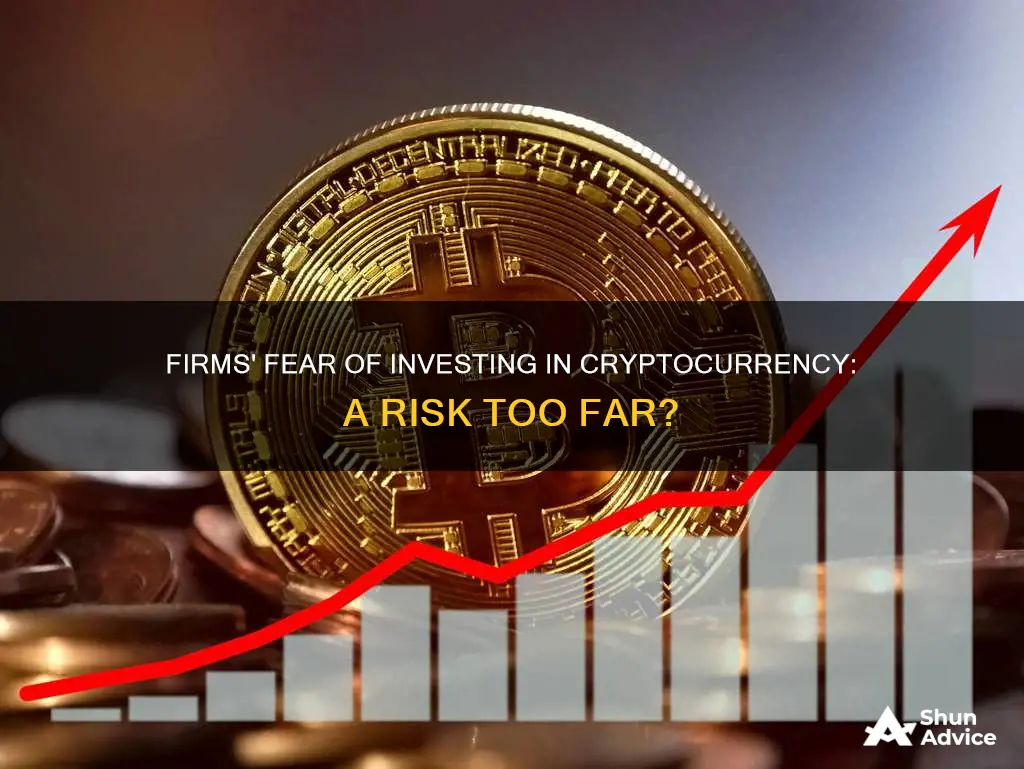
Cryptocurrency is a digital asset that is secured by cryptography. It is not issued by governments, like typical currency, and it is not physical. It is created and controlled by computer algorithms, and its transactions are recorded by miners. There are more than 1,300 cryptocurrencies in existence, with Bitcoin, Ethereum, Ripple and Litecoin being the most commonly used. Cryptocurrency is a speculative investment, and its volatile nature makes it a risky investment option. It is also highly susceptible to hacking, theft and insider trading. Additionally, it lacks intrinsic value, as it is not backed by any physical commodity or government. The unregulated nature of cryptocurrency, along with its price volatility, makes it an unattractive investment option for firms.
| Characteristics | Values |
|---|---|
| Lack of regulation | Unregulated exchanges |
| Volatility | Price swings |
| Lack of transparency | Difficult to track |
| Lack of intrinsic value | Susceptible to huge losses |
| Security | History of hacking |
| Illicit activity | Criminal uses |
What You'll Learn
- Cryptocurrency is a speculative investment with high price volatility
- Digital currencies are not issued by governments and have no intrinsic value
- The market is fragmented, with a history of hacking, theft and insider trading
- There is a lack of transparency and regulatory oversight
- It is difficult to reverse or cancel a transaction

Cryptocurrency is a speculative investment with high price volatility
The volatile nature of cryptocurrency is due to the fact that it is not backed by any intrinsic value. Unlike traditional currencies issued by governments, cryptocurrency has no physical form and is not backed by gold or other commodities. Its value is determined solely by how much people are willing to trade for it, making it highly susceptible to market speculation.
The high price volatility of cryptocurrency can be further influenced by factors such as investor attention and "attention-grabbing events". A study analysing approximately 25 million tweets about 23 of the largest cryptocurrencies found that increased investor attention, as indicated by a higher number of tweets, retweets, and favourites, corresponded to greater price volatility. Additionally, on days when investors were "distracted" by attention-grabbing events, cryptocurrency markets experienced lower price volatility.
The volatile nature of cryptocurrency makes it a risky investment. Prices can fluctuate wildly within short periods, and investors are exposed to a fragmented market with a history of hacking, theft, and insider trading. As a result, investors may lose all or part of their investment.
In conclusion, cryptocurrency's speculative nature and high price volatility make it a risky investment choice for firms, particularly those seeking stable and regulated investment opportunities.
Finding Altcoins: Strategies for Crypto Investment Success
You may want to see also

Digital currencies are not issued by governments and have no intrinsic value
Cryptocurrencies are not issued by governments, and they do not have any intrinsic value. This is because they are not backed by any physical commodity, such as gold or silver. Instead, the value of a cryptocurrency comes from the trust that its users have in it. The more people trust and adopt a cryptocurrency, the higher its value will be.
Cryptocurrencies, like Bitcoin, have a finite supply, which can increase their value over time as demand increases. This is similar to how the value of gold is determined, although with gold, there is some uncertainty about the total amount available.
While cryptocurrencies may not have any intrinsic value, they can still be used as a medium of exchange and a store of value. They offer several advantages over traditional fiat currencies, such as faster and cheaper money transfers, greater transparency, and immunity to government interference or manipulation.
However, investing in cryptocurrencies is considered risky due to their high volatility and the lack of regulatory oversight. There are also concerns about their use in criminal activities and the environmental impact of the energy-intensive mining process.
A Beginner's Guide to Bitcoin Investment via eTrade
You may want to see also

The market is fragmented, with a history of hacking, theft and insider trading
The cryptocurrency market is a fragmented one, with a history of hacking, theft, and insider trading. This makes it a risky prospect for investors, particularly those who are less risk-tolerant.
Hacking is a significant threat in the cryptocurrency market, with billions of dollars stolen from crypto platforms in recent years. In 2022, for instance, $3.7 billion was stolen, while in 2023, the figure was $1.7 billion. Cryptocurrency exchanges are a major target for hackers, with more than $1.7 billion stolen in 2023 and $3.8 billion in 2022. Some of the most notable cryptocurrency hacks include those of the Ronin Network ($625 million), Poly Network ($611 million), Binance ($569 million), and Coincheck ($532 million).
Theft is also a concern, with a recent Ernst and Young report estimating that approximately 10% of funds raised through initial coin offerings (ICOs) have been lost or stolen via hacks, amounting to roughly $400 million of $3.7 billion raised.
The market is also susceptible to insider trading, as demonstrated by the case of AriseBank, which was shut down by the SEC in January 2024 for its allegedly fraudulent ICO. The company falsely claimed it would offer FDIC-insured bank accounts through non-existent banks and failed to disclose the criminal backgrounds of its executives.
The fragmented nature of the market, combined with its history of hacking, theft, and insider trading, makes it a risky prospect for firms, particularly those that are risk-averse.
Retirement Planning: Is Bitcoin a Good Investment Option?
You may want to see also

There is a lack of transparency and regulatory oversight
Why Firms Won't Invest in Cryptocurrency: Lack of Transparency and Regulatory Oversight
The cryptocurrency market's lack of transparency and regulatory oversight is a significant concern for firms considering investment. This issue has led to increased fraud, scams, and financial crimes, causing firms to be wary of entering the market.
The lack of transparency in the crypto market is evident in the inconsistent and incomplete disclosures about digital assets and related services. This opacity leaves consumers and investors vulnerable to fraud and scams, as they cannot easily assess the risks associated with these investments. The lack of transparency also enables market manipulation and insider self-dealing, with crypto insiders profiting at the expense of customers.
The regulatory landscape for cryptocurrency is complex and varies across jurisdictions. Cryptocurrencies are generally not issued or backed by central governments, and each country has different standards and regulations. In the United States, for example, the Securities and Exchange Commission (SEC) has taken a watchful approach and worked with other countries to address cryptocurrency-related crimes. However, the lack of consistent and comprehensive regulations globally has made it challenging to prevent and address financial crimes, money laundering, and other illicit activities.
The absence of regulatory oversight in the crypto market has resulted in a fragmented market with a history of hacking, theft, and insider trading. This environment poses significant risks for investors, particularly those who are not well-versed in the complexities of the market. The lack of coherent regulations also means there are limited protections against deceptive or unethical management practices, leaving investors vulnerable to significant losses.
To address these concerns, there is a growing call for improved disclosures, transparency, and regulatory oversight in the cryptocurrency market. Senator Sherrod Brown, for instance, has urged US financial regulators to strengthen transparency to protect Americans' money. Additionally, there is a need for consistent accounting standards and guidance on reporting crypto assets on financial statements to provide investors and regulators with accurate and relevant information.
In summary, the lack of transparency and regulatory oversight in the cryptocurrency market has led to increased fraud, scams, and financial crimes. This situation has deterred firms from investing, as they seek to avoid the associated risks and uncertainties. To make the crypto market more attractive to firms, it is essential to implement robust regulatory frameworks, improve disclosures, and enhance transparency.
Bitcoin: Smart Investment or Risky Gamble?
You may want to see also

It is difficult to reverse or cancel a transaction
Cryptocurrency transactions are designed to be irreversible. Once a transaction is initiated, it is processed and confirmed by the blockchain, and there is no way to stop or reverse it. This irreversibility is due to the nature of blockchain technology, which is a decentralised and distributed ledger that records all transactions made on the network.
When a transaction is added to the blockchain, it undergoes confirmation by network participants or miners, who validate and secure the transaction data. Once confirmed, the transaction is permanently recorded on the blockchain, making any alteration or reversal impossible. This design ensures transparency, security, and immutability.
The irreversible nature of cryptocurrency transactions can be challenging, especially if mistakes occur. It is crucial to exercise caution and double-check all transaction details before confirming. Here are some essential precautions to take before sending a transaction:
- Verify the recipient's address: Always ensure you are sending funds to the correct wallet address. Copy and paste the recipient's address to minimize the risk of errors.
- Review the amount: Double-check the amount you intend to send, including decimal places and transaction fees.
- Use test transactions: If you are new to cryptocurrency, consider conducting test transactions with small amounts to familiarize yourself with the process.
- Stay informed: Educate yourself about the specific cryptocurrency you are using. Understanding the transaction mechanics and associated risks empowers you to make informed decisions.
While it is not possible to cancel or reverse a cryptocurrency transaction once it has been initiated, you can take steps to prevent errors or fraudulent activities. Double-checking transaction details, creating contacts for recipients, and utilizing peer-to-peer transfers offered by custodial wallets can help ensure accurate and secure transactions.
SMSFs and Bitcoin: Exploring Investment Opportunities
You may want to see also
Frequently asked questions
Cryptocurrency is a risky investment due to its price volatility, lack of regulation, and history of hacking, theft, and insider trading. It is also not issued by governments, so it has no intrinsic value. Additionally, it is a speculative investment with no history of success, and there is a chance of losing all or part of the investment.
Fund selectors oversee the investments available to customers at various financial institutions. According to a survey, 68% of fund selectors do not think individuals should have access to cryptocurrency due to concerns related to transparency and regulation.
Proven investments are regulated and have a history of success, making them a safer option for compounding wealth. They also have the backing of the issuing country, unlike cryptocurrency, which is only backed by computer code.
Investing in cryptocurrency is very risky due to its price volatility and lack of downside risk protection. There is also a high risk of losing money due to hacking, theft, or insider trading. Additionally, there is a lack of transparency and regulation in the cryptocurrency market, making it challenging to recommend to investors.
Cryptocurrency scams may involve false claims, such as offering FDIC-insured bank accounts through non-existent banks, or failing to disclose the criminal backgrounds of company executives. These scams can result in significant financial losses for investors.







